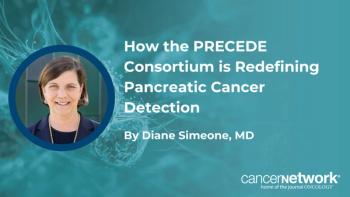
Benjamin H. Lowentritt, MD, FACS, Discusses How 18F-rhPSMA-7.3 PET Expands the Armamentarium for Suspected Recurrent Prostate Cancer
Novel PSMA-targeting PET ligand 18F-rhPSMA-7.3 adds to the recurrent prostate cancer armamentarium, according to Benjamin H. Lowentritt, MD, FACS.
During the
Transcript:
The great part about the SPOTLIGHT study is that it’s adding to the armamentarium that we have for diagnosis and eventually treatment of prostate cancer. [18F-rhPSMA-7.3] is an agent that seems to have the potential for less bladder uptake; it’s a little bit less excreted in the urine and accumulates less in the bladder. The hope would be that it would allow for a very clear picture within the bladder when there’s something to be found there. It continues to add to the options that we have and the hope that this will be available clinically in the future. It’s very promising to have more and more options.
Reference
Lowentritt, B. Impact of Clinical factors on 18F-rhPSMA-7.3 detection rates in men with recurrent prostate cancer: findings from the phase 3 SPOTLIGHT study. Presented at 2022 American Society for Radiation Oncology Annual Meeting (ASTRO); October 23-26, 2022; San Antonio, TX. Abstract 1049. Accessed November 3, 2022.
Newsletter
Stay up to date on recent advances in the multidisciplinary approach to cancer.










































